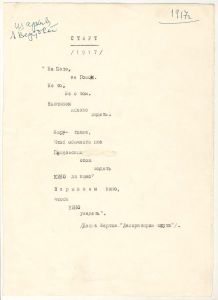V 001
|
Start, 1917
|
||
| Three-verse programmatic poem by Vertov, in which his departure from the traditional newsreel approach of the French companies Pathé and Gaumont is euphorically proclaimed. Conventional cinema had to be violently blown up, in order to make room for a new cinema and a new vision, comparable to the scientific revolution of a Newtpon or a Pavlov. | ||
| Classification: | Manuscript/Typescript | |
| Type: | Poem | |
| Other publications: | Deutsche und englische Übersetzung und Faksimilierung im Katalog "Die Vertov-Sammlung im ÖFM". Deutsche Übersetzung v. Alexandra Gramatke in: Tode / Gramatke 2000, S. 200; Englische Übersetzung v. Yuri Tsivian für die Sacile-Ausstellung; Übersetzung und Faksimilie abgedruckt und kommentiert in: Tsivian 2004, S. 35. In Peter Konlechners Film "Dziga Vertov" (1974) liest Svilova das Gedicht vor. | |
| Date: | 1917 (?), eher nach 1922 | |
| Tapematerial: | Paper with Typewriting | |
| Original / Reproduction: | Original | |
| Comments: | Even the typographical arrangement of the lines of verse intimates an overthrow: it is the same stepped form which Vladimir Majakovskij had adopted in his Russian revolutionary poetry. Further particularities of the poem include the fact that this is perhaps the first time that the pseudonym 'Dziga Vertov' appears, likewise the phrase "laboratory of hearing" and that the poem is dated 1917 (confirmed in Svilova's handwriting in the top right-hand corner). It thus may be assumed that the poem was written before Vertov's famous manifestos "My. Variant manifesta" (1922) and Kinoki. perevorot (1923). Yuri Tsivian regards the date '1917', which appears beneath the title, as being part of the title itself and on the basis of the programmatic nature of the poem argues that it should be dated to post-1922. Aleksandr Derjabin claims that this document in its final form was written (typewriter) only in the second half of the 1940s, a period where Vertov used to look back at his own career. | |
